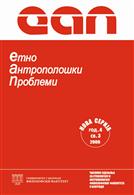Uticaj Džejmsa Kliforda na Bronislava Malinovskog. Moralne implikacije intertemporalne heterarhije
James Clifford's Influence on Bronislaw Malinowski: The Moral Implications of Intertemporal Heterarchy
Author(s): Miloš MilenkovićSubject(s): Anthropology, Methodology and research technology, Theory of Literature
Published by: Филозофски факултет, Универзитет у Београду
Keywords: James Clifford; Bronislaw Malinowski; history of anthropology; the writings of political subjects; the writings of disciplinary founders; intertemporal heterarchy; reversible genealogy;
Summary/Abstract: Drawing on the explanation already offered for the confusion of positivism with realism in the epistemological imagination of the author and founder of postmodern anthropology, the paper analyzes the moral implications of dealing with problems characteristic of the philosophy of science by literary-theoretical means. The transdisciplinary migration of "realism" from literary theory to social science methodology has produced a whole new history of anthropology. The history of pre-postmodern anthropology constructed in this manner can be said to fit the register of some sort of comparative-cultural theory of retroactive moral judgement, complementing postmodern anthropology as a general theory of writing by political subjects, so that the theoretical- methodological dilemmas of postmodern anthropology do not constitute proof of the legitimacy of a holistic interpretation of the discipline’s founders’ intentions, but rather lead to neo-pyrrhonic, formalistic endeavours to uphold, by respecting academic trappings, the academic authority of the discipline whose subject, method and purpose, as a rule, even colleagues from adjacent departments for various reasons fail to understand. In the paper, evidence for this is derived from Clifford's writing of Malinowski, and the moral implications of the unfortunate analogy between the writing of political subjects and the writing of disciplinary founders are followed through. The paper then goes on to explain that the critique of the possibilities of misuse, particularly through political instrumentalization, of anthropological fictions as evidence of Others did not have to come at the cost of sacrificing the semblance of continuity in the establishment of anthropology as a proper academic discipline.
Journal: Етноантрополошки проблеми
- Issue Year: 4/2009
- Issue No: 3
- Page Range: 17-29
- Page Count: 13
- Language: Serbian

